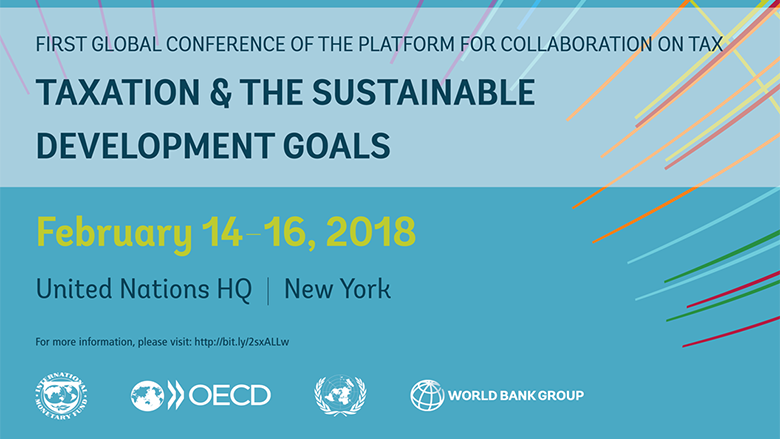The Platform for Collaboration on Tax (PCT) will hold its First Global Conference on February 14-16, 2018 at the United Nations Headquarters in New York. The conference will focus on the key directions for tax policy and administration needed to meet the Sustainable Development Goals (SDGs).
Speakers and participants will include senior country policymakers, tax administrators, and representatives from academia, the private sector, civil society, donor organizations, and regional tax organizations. Conference sessions will cover five thematic areas:
domestic resource mobilization and the state
the role of tax in supporting sustainable economic growth, investment and trade
the social dimensions of tax (poverty, inequality, and human development)
tax capacity development
tax cooperation.
The conference will build on the vibrant global dialogue on taxation, and insights and views from the conference will help inform and shape the future work of the PCT and its members. The conference also aims to provide guidance to individual countries and other stakeholders on how to better target tax efforts to achieve the Sustainable Development Goals (SDGs).
Plenary sessions will be broadcast live here: http://webtv.un.org
Attendance at this conference is by invitation only.
Registration to participate has now closed. For any inquiries related to registration, please contact: platformconference@worldbank.org.
About the PCT
The PCT is a joint initiative of the International Monetary Fund (IMF), Organization for Economic Co-operation and Development (OECD), United Nations (UN), and the World Bank Group to strengthen collaboration on domestic resource mobilization (DRM). The Platform, which is also supported by the governments of Luxemburg, Switzerland, and the United Kingdom, fosters collective action for stronger tax systems in developing and emerging countries. The four PCT members each support country efforts through policy dialogue, technical assistance and capacity building, knowledge creation and dissemination, and input into the design and implementation of standards for international tax matters. The PCT also produces guidance and tools on key issues of capacity building and international taxation, and has also developed the Medium-Term Revenue Strategy, which is an approach for coordinated and sustained support to country-led tax reform.
Last Updated: Feb 13, 2018
